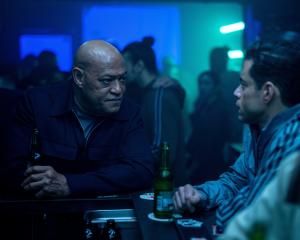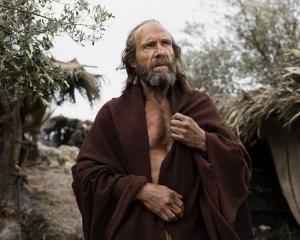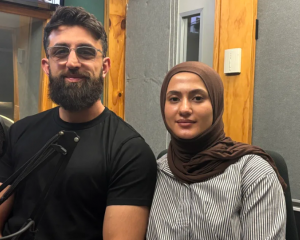To many, Norma Khouri's international bestseller, Forbidden Love, about the honour killing of her best friend in her native Jordan, was a poignant real-life tale of horrific crimes in the Middle East.
Translated into 16 languages, the book transfixed Western readers taken with the raw and emotional account of a young Muslim woman's brutal murder at the hands of her father for secretly dating a Christian soldier.
Though the book did not find its way to acclaimed documentary director Anna Broinowski, neither did it go unnoticed.
‘‘I deliberately didn't read the book, as the pretext behind it made me very angry. Here we were on the verge of America invading Iraq and there is this sensationalised piece of Western propaganda about evil Arab men and repressed women,'' Broinowski says.
That all changed when Sydney Morning Herald journalist Malcolm Knox outed Khouri as a fraud in 2004. Broinowski suddenly became interested.
‘‘At the time, I was working on getting another idea off the ground related to the war and all anybody wanted to talk about was the Khouri story. So I emailed Norma and, to my surprise, she agreed to meet me.''
Unlike the virginal character that she had created for herself, Norma Khouri was actually living in Chicago, married with two children, and under investigation by the FBI.
Once the Knox expose was published, Forbidden Love was pulled from publication and Khouri herself went to ground.
So, on the face of it, it seems quite remarkable that she agreed to come out of hiding for a documentary film-maker intent on digging further into the deception.
Broinowski offers an explanation: ‘‘Norma is a master actress and I'm convinced that she craved the attention of the camera.''
With Khouri's interest suitably aroused, Broinowski flew to San Francisco and conducted an intensive two-day interview that yielded 13 hours of material.
‘‘The interview was like watching a master magician. Her performance is so good that you can never be sure if she is telling the truth,'' Broinowski says.
Indeed, after this gruelling exercise, Norma Khouri had convinced Anna that her story was true and the only way to sort out fact from fiction was to visit Jordan. So they did.
A self-described ‘‘reverse propagandist'', Broinowski discovered a wealth of additional material on location that conflicted with her script and the research to that point. But far too invested in the saga that was unfolding, she decided to run with it, and the film Forbidden Lie$ took on a life of its own.
‘‘My role is to play the devil's advocate, to challenge people to think about propaganda in media. Make no mistake, this film is not about honour crimes, it is about spin and truth in the West.''
With a little more investigation, Broinowski discovered that rather than the 2000 honour killings supposedly occurring in Jordan every year, as mentioned in Khouri's book, there were on average somewhere between 12 and 17.
‘‘Crimes of passion transcend all societies and they number far more in Western countries than the so-called honour killings in Arab countries. If anything, Forbidden Lie$ is about analysing the whole sorry saga from the perspective of the Jordanians.''
Broinowski had never considered when pitching the film that Forbidden Lie$ would be a psychological thriller in the vein of Catch Me if You Can, a tale of an unrepentant con-artist. But this is precisely what unfolded.
‘‘I wanted to make the film like a courtroom drama, where the facts are presented for the audience to make up their own minds. I didn't want to feel like I had to blatantly reveal everything, which would leave me space to choose when to pull the camera back to reveal the artifice.''
Indeed, one of the most striking aspects of Forbidden Lie$ is its visual style. Computer-generated imagery (CGI) adds a certain comic-book style to the film that succinctly complements the themes informing the narrative.
According to Broinowski, CGI has been an important component within each of her films to date, but the challenge is always to use it in a really distinctive and clever way.
‘‘Stylistically, I wanted to mirror what Norma does to her victims with some subtle sleight of hand of my own. I actually went through two editors in the process of trying to achieve the desired structure and suspense that I envisaged.''
From the elaborate set-ups, re-enactments and stylised visual metaphors to the uncanny choice of music, Forbidden Lie$ is chock-full of references to other texts.
‘‘Yeah, I like to play fast and loose with genre, hop about conventions and, in this case, create this hybrid that I guess you could call docudrama-thriller,'' says Broinowski.
‘‘The song selections are important for sure, but they just kind of chose themselves. I mean, just listen to the lyrics of She's Not There.''
Well, no-one told me about her, the way she lied, Well, no-one told me about her, how many people cried, But it's too late to say you're sorry, How would I know, why should I care, Please don't bother tryin' to find her, She's not there. (Excerpt from The Zombies classic 1964 hit).
Crying foul over a supposed abuse of literary licence is one thing, but Broinowski has also been accused of detracting from the real issue of honour crimes. Does that sit easily with her?
‘‘Well, there will always be a percentage of the population who believe what they want to believe. Fortunately most people understand that Forbidden Lie$ is a lesson in how truth is constructed and is not about honour crimes.''
By her own admission, Forbidden Lie$ is Broinowski's most challenging film and the one she is most proud of. It has all the elements of the best crime thriller combined with a stellar cast - except for one major difference... they are all real.
Forbidden Lie$ screens in Dunedin at the Regent on Saturday April 26 and Monday April 28.












